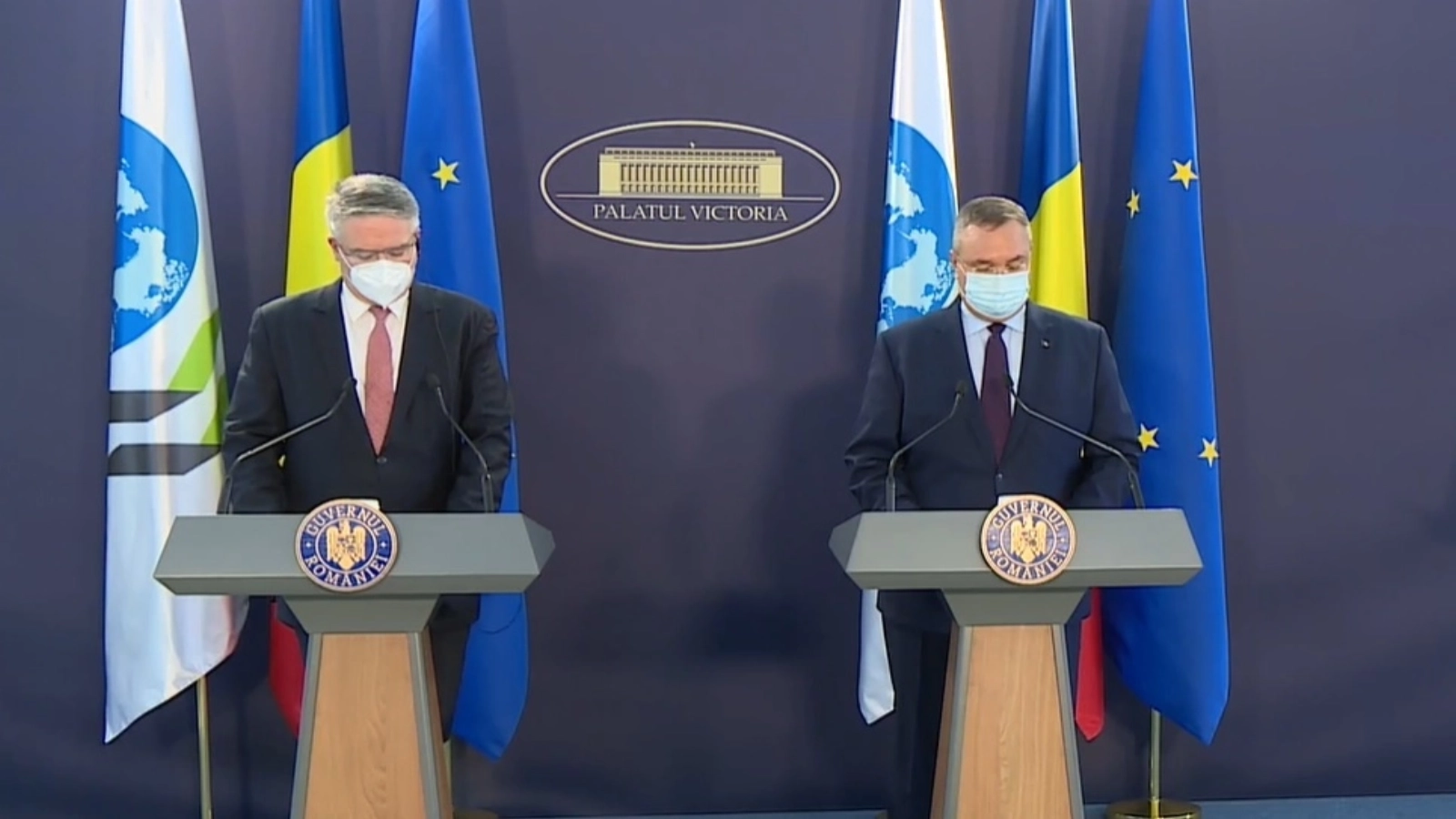The "Economic Survey for Romania" developed together with the Organization for Economic Cooperation and Development (OECD) shows Romania's firm commitment to join this global policy forum and provides a multidimensional X-Ray picture of the country's social and economic realities, while offering decision makers a set of extremely useful recommendations for measures capable of generating development and well-being on intelligent, sustainable and inclusive bases, Prime Minister Nicolae Ciuca said on Friday, as he welcomed OECD Secretary-General Mathias Cormann who came for the survey's launch event, two days after the OECD Council vote to open accession talks with Romania.
The head of the government thanked the OECD top official for his efforts to unblock the expansion of the organization.
"We are aware of your essential role in the decision of the OECD Council and we thank you on behalf of Romania and of myself, personally," said Nicolae Ciuca.
The Prime Minister mentioned that Romania immediately called the Inter-ministerial Committee for OECD Accession, which approved at its meeting on January 26 Romania's adhering to the organization's principles, values and standards, as affirmed and developed in the two OECD documents - "The OECD Vision Statement" and the "2021 Ministerial Council Statement".
The head of the Executive stressed that, at this time, Romania is already adhering to 6 of the 8 essential standards for accession: the Investment Statement; the Principles of Corporate Governance; the Principles for Internet Policy Making; the Recommendation on Good Statistical Practice; the Inclusive Framework on BEPS - Base Erosion and Profit Shifting; the Global Forum for Transparency and Information Exchange.
According to the Prime Minister, in the coming months Romania will begin work to join the Liberalization Codes.
"Also, our country has already expressed its intention to accede to the OECD Anti-Bribery Convention. All these commitments translate into relevant reforms for the modernization of our country's economy," Nicolae Ciuca added.
The Prime Minister pointed out that the "Economic Survey for Romania" is among the projects our country is already developing together with the OECD, which shows its firm commitment in terms of joining the organization.
"The survey represents a multidimensional X-ray picture of Romania's social and economic realities, providing decision makers with a set of extremely useful recommendations for those measures aimed at generating development and well-being on an intelligent, sustainable and inclusive basis. The first part is dedicated to key political perspectives, and includes a presentation of the macroeconomic situation and medium-term developments, with a special focus on the pandemic and its implications for the economy," Ciuca said.
The head of the government added that the survey includes several references to Romania's National Recovery and Resilience Plan approved by the European Commission in September, specifying that it focuses on areas where urgent investment is needed.
"The reforms and investments set forth in the plan will contribute to the development and modernization of the Romanian economy in areas such as: public finance sustainability, consolidation of public administration and resilience of the health system, ensuring social and territorial cohesion, digitisation of the public administration and many others. A series of recommendations in the survey find their response in the measures envisaged by the Romanian state in the National Recovery and Resilience Plan," PM Ciuca explained.
He also reviewed the conclusions of the study with regard to the business environment, transport infrastructure and the green transition.
"The thematic chapter on business environment analysis also includes sections on the need to adapt financing access to the needs of companies, the governance of state-owned enterprises or the need to improve judicial efficiency and insolvency arrangements in order to increase business dynamism. Transport infrastructure and the green transition are key areas, their importance being reflected in the PNRR [National Recovery and resilience Plan], through the largest financial allocation. The survey highlights the need to bridge transport infrastructure gaps in order to increase productivity and reduce regional disparities," Ciuca said.
In the present survey, the Prime Minister went on to say, analyses were carried out on the lack of proper correlation between the needs of the labor market and skills, aspects related to informal work, prevention of school dropout, improvement of the quality of education and of vocational training, promotion of digital skills in primary education.
"The Romanian authorities are aware of the need to improve conditions in the labor market. Further efforts are needed to increase the participation of young people, to protect vulnerable groups, especially in marginalized communities, to support training programs," Ciuca said.
The Prime Minister also stressed that in the current pandemic context, the Romanian Government has adopted a series of innovative measures, in line with the evolution of the situation registered at national level and the needs of the labor market, in order to maintain jobs in the affected economic sectors and prevent the rise in unemployment.
He pointed out that, with regard to the pension system, Romania is undergoing a full reform process, with the legislation under evaluation and legislative measures to be adopted to ensure the sustainability and predictability of the public pension system in the medium and long term, to correct the dysfunctions and inequalities between different categories of beneficiaries, to strengthen the principles of contributivity, social solidarity and equality.
The head of the Executive also appreciated the survey's recommendation to reduce the educational gap, especially in disadvantaged areas.
"The survey considers that improving access to education and training is one of the most important areas that can contribute to economic recovery and raising the standard of living. We appreciate the recommendation to speed up measures to support students who are at risk of dropping out of school and to reduce educational gaps, especially in disadvantaged areas," Ciuca said.
The Prime Minister stated, as a first conclusion, that the survey is a useful tool, which brings a high added value to political decision-makers, emphasizing in a balanced way the efforts made so far by our country, but at the same time offering useful recommendations in the fields of special importance for Romania.
Specifically, he pointed out that among the main conclusions of the OECD Economic Survey Romania 2021 on the Romanian economy, the following should be noted:
* Economic growth is robust, but the risks are still high;
* Macroeconomic policies have supported the economy; and monetary policies must remain vigilant and respond to inflationary pressures. In terms of fiscal policy, it needs to adapt to rapid and targeted economic developments;
* Romania must take advantage of the opportunity provided by the European funds, especially on the Next Generation component;
* The public pension system needs to be reformed to ensure the sustainability of public finances;
* Reforms can improve efficiency and fairness in the tax system;
* Improving access to a better education and health care system is the key to the progress in living standards. Economic policies must aim to reduce high rates of inactivity and the informal economy. European funds must be used to respond to social and environmental challenges, including reducing pollution;
* There are high regional disparities in living standards and economic opportunities,
* As in OECD countries, labour market integration of people with low levels of education (especially young people, women and the Roma population) is difficult. In order to improve performance in the labor market, it is necessary for all citizens to acquire adequate skills;
* Business-friendly reforms, an efficient allocation of resources and the reduction of infrastructure disparities are key to productivity gains;
* Improving the regulatory and competitive framework can stimulate productivity growth;
* Although access to finance has improved, SMEs need increased support for access to financial and banking instruments;
* Increasing the predictability of regulations for supporting the business environment in terms of the investment process;
* Continuing the fight against corruption will lead to increased confidence in state institutions.
"We have assimilated all these elements and we are preparing to absorb them in the current public policies in Romania in the next period," Ciuca concluded.
































Comentează